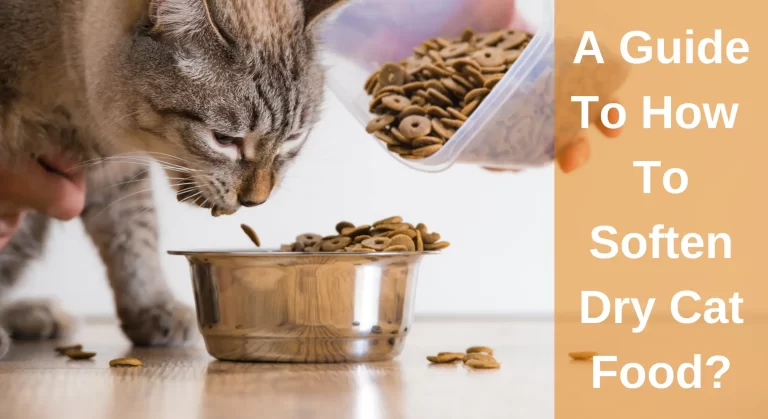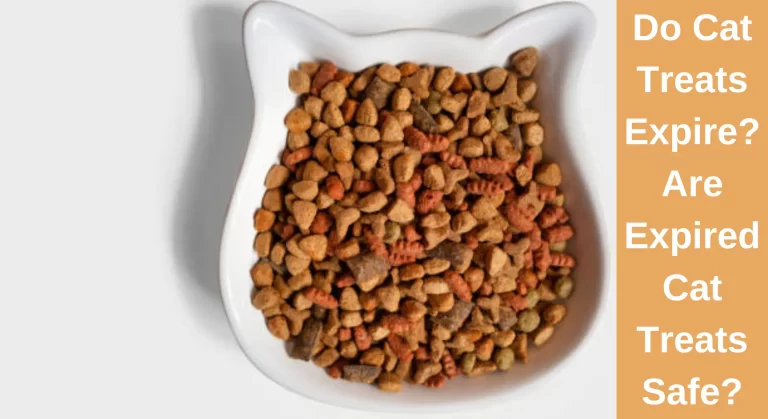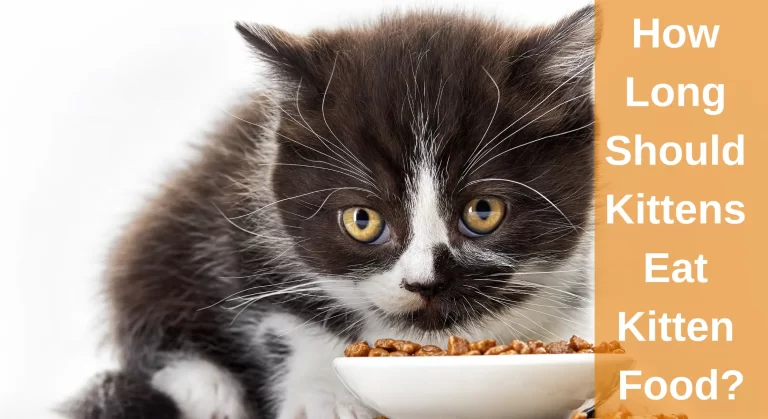Can Cats Eat Honeydew? Understanding the Benefits and Risks
When you found your feline curious to taste the food you eat, you may begin searching out meals that are healthy for your felines. The majority of cats aren’t that much interested in fruits, however, if you find your feline interested to taste honeydew melon or eat a piece of it, you may be thinking about whether it’s safe for your feline to eat. “Can Cats Eat Honeydew”
Yes, honeydew is safe for your feline. This juicy sweet fruit contains high water content and vitamins; it serves as the best snack for your feline in the summer season. But makes sure to give little chunks of honeydew without the peel or seeds. Due to the fruit’s high sugar content, your feline may get hyperglycemia, excess weight, and other issues.
Are you curious to learn more details about the advantages of serving honeydew to your felines, its nutritional value, and its health risks? Then keep scrolling to read this article, as we’ve mentioned more details about how you can feed honeydew to your cat, why your cat is obsessed with this fruit, its benefits, drawback, and much more!
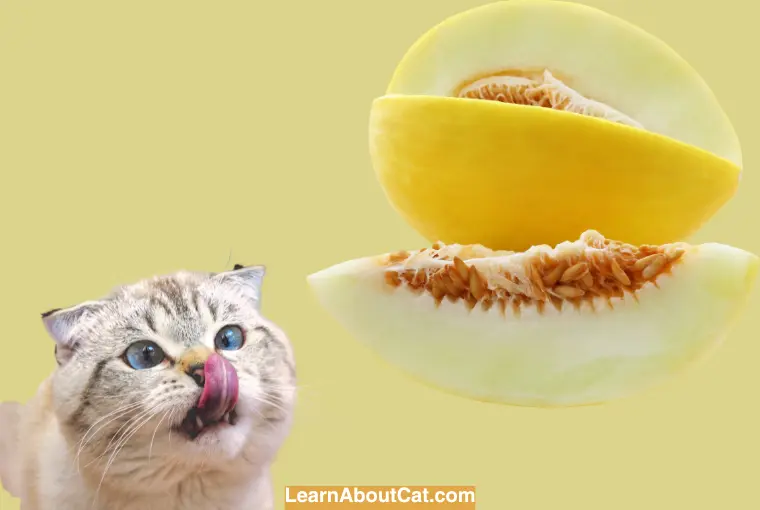
What is Honeydew?
Honeydew is a type of melon that is typically oval-shaped and has a smooth, pale green rind. The flesh inside is juicy and sweet, with a light green or white colour. Honeydew is a popular summertime fruit that is often consumed as a snack or used in fruit salads, smoothies, and other desserts.
Can Cats Eat Honeydew Melon?
Yes, cats can safely consume honeydew melon in moderation without peel and its seeds. If you chop the honeydew into small chunks and give this to your cherished cat, it is risk-free to eat. Fresh honeydew from the farm is okay for cats to eat, however, it is recommended to get a fresh melon for your furry pet.
These melon kinds are a fantastic supply of water for your feline, particularly in warm summer months when your feline is more prone to dehydration from the intense heat outside. Honeydew is a healthy food for your feline as compared to certain other fruits such as bananas, pears, or grapes, which can be lethal to your cats.
This tasty food is low in both carbohydrates and fat, yet it is packed with nutrients and is good for your cat’s health in a number of ways.
Your cat’s immunity system is regulated and strengthened by organic molecules, which are present in honeydew. As soon as you serve honeydew by deseeding it and removing its skin, it is harmless for your felines.
Check Out: Can Cats Eat Cantaloupe? Benefits And How to Feed
Can Cats Eat Honeydew Melon Skin?
No, you can’t feed your feline honeydew melon skin because it’s quite hard to chew. Moreover, its stiff skin may also cause choking or blockage in your cat’s throat; resulting in risking your cat’s life.
So, it’s advised to remove the peel and its seeds as well while serving it to your cat. Because seeds can’t be digested by your cats and may cause digestive issues.
Honeydew and Feline Nutrition: Health Benefits of Cats Eating Honeydew Melon
Melons like honeydew have a delicate flavour and a crisp mouthfeel. They are loaded with moisture and have a faint smell and luscious flavour. Here are a few of Honeydew’s biggest advantages for your fur babies.
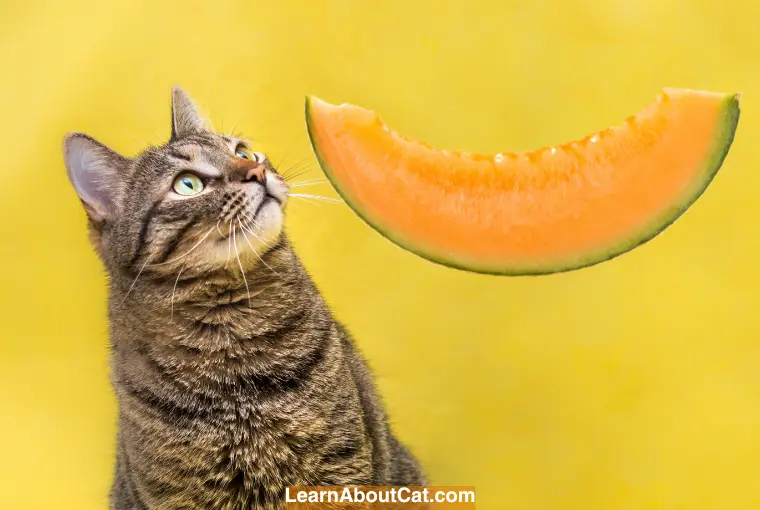
Vitamin C
It is rich in vitamin C that supports your feline’s immunity and strengthens it against highly hazardous reactive oxygen species that can injure cells and the body’s tissues and hinder your cat’s ability to recover from illnesses and traumas. Vitamin C is essential for your cats’ well-being since it helps to prevent the onset of tumours and other ailments in the body.
Niacin
Niacin is also present in honeydew melon in moderate amounts. Niacin plays a crucial role in accelerating metabolism and helping a cat’s body release energy from fat deposits.
Vitamins B
Vitamins B6 and B12 help blood circulation and brain systems. The neurological mechanism and the conversion of energy from food both require these 2 vitamins. For glowing skin and thick fur, these vitamins are crucial. It also helps cats’ neurological systems function normally and help their bodies turn energy from food so they can hunt, jump, and remain active all day.
Essential Micronutrients
It also contains calcium and phosphorus which is essential for felines’ growth and maintaining their healthy skeleton, gums, and heart. Iron is also present in this fruit which is necessary for the development of RBCs and for maintaining strong immunity.
Trace minerals such as magnesium and potassium are also present that help keep the bones of your felines strong and also maintain healthy teeth. Moreover, also keeps their blood pressure normal and regulates neural signalling.
Honeydew is also packed with sodium that helps feline absorb liquids and minerals in the intestinal tract. Also, felines’ muscles need sodium to relax and contract.
Moreover, zinc found in honeydew has an impact on a number of important bodily processes, such as reproduction, metabolism, and the formation of skeletal and muscle tissue.
Also, Check Out: Can Cats Eat Lychee?
Drawbacks of Honeydew: Risks of Feeding Honeydew to Cats
Despite the fact that honeydew has a few advantages for cats, their normal diet shouldn’t be substituted. Being carnivores, cats’ bodies require meat protein to live. Therefore, feeding honeydew may pose the following negative issues:
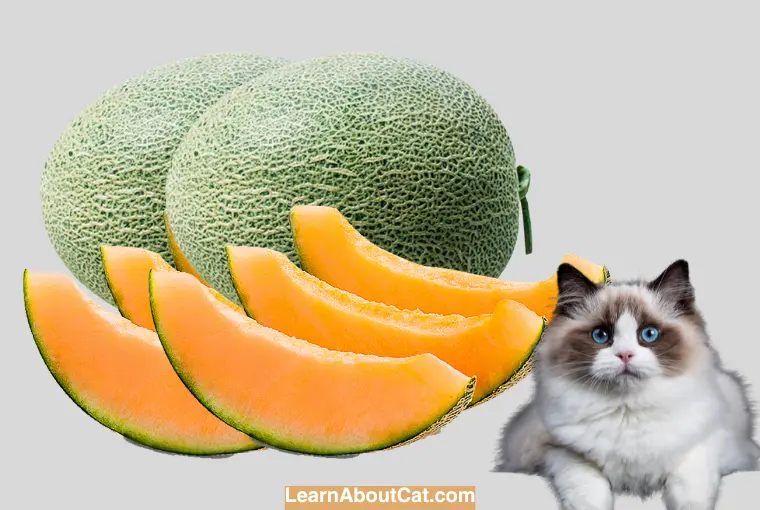
- If you give them Honeydew as their main diet, they won’t get enough nourishment. Due to their high protein diet, cats’ tummies are unable to absorb large quantities of Honeydew.
- Ingestion of Honeydew seeds by your furry companion may have terrible effects. Additionally, these seeds may become lodged in their jaws. Your cats might feel irritation and even pain in their mouths if the object isn’t removed.
- The Honeydews are packed with sugar which may increase your feline’s weight if you give them in excessive quantities.
- Honeydew stiff skin can cause choking, intestinal obstruction, and other digestive problems.
Find Out: Can Cats Drink Lemon Water?
Preparing the Honeydew for Cats
When you feed your feline honeydew, must remove the peel and the seedlings. If your cat swallows the peel, it may cause obstruction in the feline’s intestines that needs to be surgically removed. Additionally, it might pose a choking risk. Although the seedlings are not poisonous, your feline can have difficulty absorbing them.
You might offer your feline a small chunk to gnaw on or add a little honeydew nectar to a dish. Just be careful to only give out little bits to prevent choking risks. Just keep in mind that even though honeydew is okay for cats, they shouldn’t consume it frequently.
Intresting Reading: Can Cats Eat Bananas? Are Bananas Safe for My Cat?
How to Feed Honeydew Melon to Cats?
You have to take a few steps before giving your furry friends honeydew.
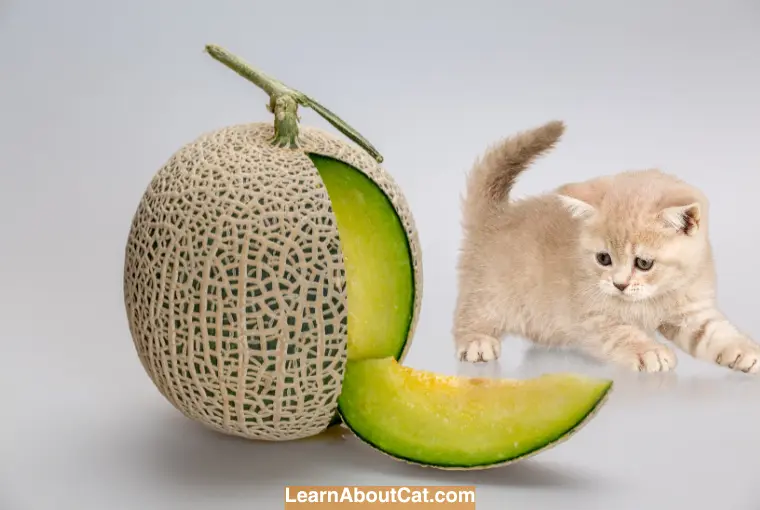
The Honeydew should first be thoroughly washed with water to remove any undesired or hazardous fertilizers or chemicals.
Secondly, remove the Honeydew rind since felines may be harmed by it. These melons have a tough outer layer that might clog your feline’s gut and esophagus. Aside from it, when your feline has swallowed the tough outer layer, surgery is required to remove the trapped chunk from its stomach.
The Honeydew melon should then be sliced into little pieces. Your furry companions typically gulp more food and take large bites. Choking is a possibility if you feed these big pieces of this crispy melon. There are three ways to feed honeydew to your felines:
- Blend the Honeydew fruit chunks, then feed your cat a tiny cup of its juice.
- Feed your cats the finely chopped pieces.
- To make a salad for your cats, combine some slices of Honeydew fruit with other foods.
How Much Honeydew Can Cats Eat?
As with any human food, it is important to feed honeydew to your cat in moderation. The general rule of thumb is that treats should make up no more than 10% of a cat’s daily caloric intake. Additionally, it is important to monitor your cat’s weight and adjust their diet accordingly.
Why is My Cat Obsessed With Honeydew?
Felines enjoy eating Honeydew despite the fact that they’re meat eaters. It can be due to this fruit’s powerful fragrance or aroma. The major source of the honeydew flavour comes from the volatile components present in this fruit. These volatile organic compounds are rich in amino acids.
Additionally, amino acids are fundamental components of protein and are abundantly found in animal flesh. These amino acids are also found in honeydew in fewer amounts due to which certain cats are obsessed with Honeydew.
Alternatives to Honeydew for Cats
While honeydew is generally safe for cats to consume in moderation, there are other fruits and vegetables that may be better suited to their dietary needs. Some options include:
- Blueberries: These are a great source of antioxidants and vitamins, and are low in calories.
- Green beans: These are high in fibre and can help with digestion.
- Cooked pumpkin: This is a great source of fibre and can help with both digestion and weight management.
Find Out: Can Cats Eat Human Food? List of Human Foods That Cats Can and Cannot Eat
Frequently Asked Questions
Can cats safely consume honeydew?
Yes, you can feed your feline honeydew in small quantities without its peel and seedlings. If you make honeydew a part of their normal diet they’ll be more prone to health issues due to its high sugar content. Moreover, its seedling and peel can cause choking or gastrointestinal issues.
Can kittens eat honeydew?
Although kittens can safely consume honeydew, giving them excessive amounts of it can make them sick. Certain honeydew has a gel-like texture, which kitties may take completely without chewing. They may suffocate and pass away as a result. Also, it is important to consult with a veterinarian before introducing any new foods to their diet.
Why do cats love melon?
Melon contains volatile compounds in its aroma. These compounds make melons aroma similar to proteins. So, when felines sniff melons they believe that it’s meat and that’s why they love to eat them.
Is honeydew a good source of hydration for cats?
Honeydew contains a high water content and can be a good source of hydration for cats. However, it should not replace a cat’s regular intake of water.
Can honeydew be given to cats as a treat?
Yes, honeydew can be given to cats as a treat in moderation. It is important to remember that treats should make up no more than 10% of a cat’s daily caloric intake.
Conclusion
In summary, your felines can enjoy honeydew with you. It is among the fruits that felines can eat in little amounts occasionally because it is not hazardous to them.
However, honeydew seeds and their tough skin should not be given to cats since they can be harmful. Additionally, giving them small portions rather than large ones is preferable. This technique will help to prevent your feline from the risk of choking hazards.
Moreover, honeydew isn’t a necessary part of your cats’ diet, however, it is safe. So, if you feed it in bulk amounts it may pose a health hazard to your felines. But if you give a little quantity of honeydew to your feline, then it’s the finest fruit that can be served as a treat to your feline in the summer without being overly concerned about potential concerns.
Related Posts:
Who is Isabella?
My name is Isabella, and I am a dedicated and knowledgeable cat enthusiast. With years of experience caring for cats and a deep love for felines, I made a mission to help other cat lovers navigate the challenges of cat ownership.

